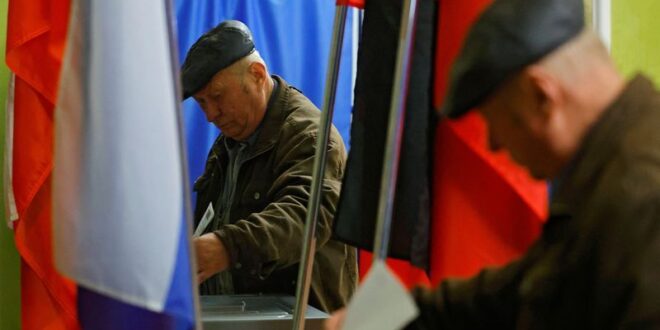MOSCOW (Reuters) – A Ukrainian missile attack killed two people in western Russia and a separate drone strike set an oil refinery ablaze on Saturday, the second day of an election that President Vladimir Putin has accused Kyiv of trying to disrupt.
The deaths of a man and a woman were reported by Vyacheslav Gladkov, governor of the Belgorod region where cross-border attacks from Ukraine have become part of daily life.
Dmitry Azarov, governor of the Samara region 850 km (530 miles) southeast of Moscow, near the border with Ukraine, said the Syzran refinery was on fire but an attack on a second refinery had been thwarted.
Ukraine has staged repeated strikes this week on Russian refineries. Russia mounted its deadliest attack in weeks on Friday when its missiles hit a residential area in Ukraine’s Black Sea port city of Odesa, killing at least 20 people and wounding more than 70.
The Ukraine war has cast a shadow over voting in a three-day presidential election that is all but certain to hand Putin six more years in the Kremlin.
Aged 71 and in power as president or prime minister since the last day of 1999, he dominates Russia’s political landscape and none of the other three candidates on the ballot paper presents any credible challenge.
His leading critics are in prison or have fled abroad, prompting the opposition to call the vote a sham. Russia’s best known opposition politician, Alexei Navalny, died in an Arctic penal colony last month and his supporters have accused Putin of having him killed. The Kremlin denied that, and his death certificate said he died of natural causes.
HIGH TURNOUT IN SOME REGIONS
The Kremlin is hoping for a high turnout to demonstrate that the country is united behind Putin.
Overall turnout was nearly 38% by the morning of day two. Some of the highest rates – approaching 70% – were reported in the Belgorod region where the missile strike occurred and in Russian-controlled regions of Ukraine where Kyiv says voting is illegal and void.
Russia’s governing party, United Russia, said on Saturday that it was facing a widespread denial of service attack – a form of cyberattack aimed at paralysing web traffic – and had suspended non-essential services to repel it.
Friday’s voting saw a handful of protests including the pouring of dyed liquid into ballot boxes and the throwing of a Molotov cocktail at a polling station in Putin’s home town, as well as reported cyber attacks.
(Reporting by Reuters; Writing by Mark Trevelyan; Editing by Frances Kerry)
 BeritaKini.biz Berita Viral Terkini di Malaysia
BeritaKini.biz Berita Viral Terkini di Malaysia





